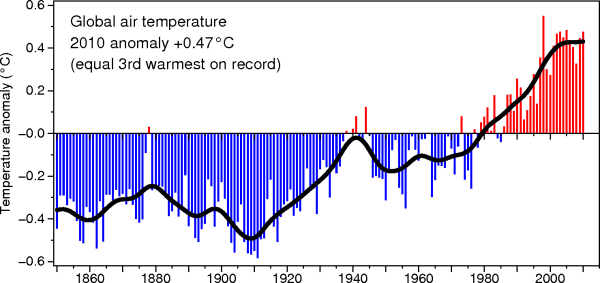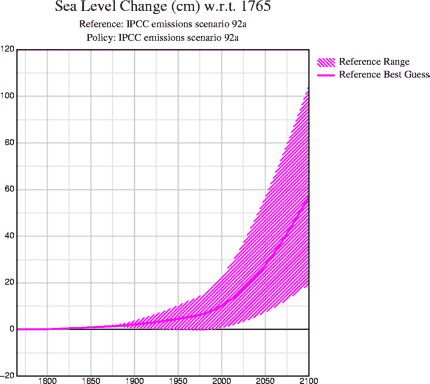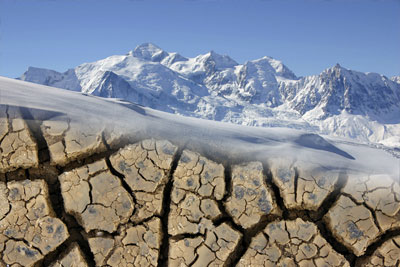Climate Research Unit released climate dataset – Facts and figures for anyone

Temperature records going back 150 years from 5113 weather stations around the world were released to the public by the Climatic Research Unit (CRU) at the University of East Anglia in Norwich, UK. The only records missing are from 19 stations in Poland, which refused to allow them to be made public.
According to Trevor Davies, the university’s pro-vice-chancellor for research at Climatic Research Unit (CRU) , they released

Poland refused, and the information commissioner overruled Trinidad and Tobago’s wish for the data it supplied on latitudes between 30 degrees north and 40 degrees south to be withheld, as it had been specifically requested by Jones and Keiller in their FOI request and previously shared with other academics. The end result is that all the records are there, except for Poland’s. Davies’s only worry is that the decision to release the Trinidad and Tobago data against its wishes may discourage the open sharing of data in the future. Other research organisations may from now on be reluctant to pool data they wish to be kept private.

Davies is confident that genuine and proper analysis of the raw data will reproduce the same incontrovertible conclusion – that global temperatures are rising. “The conclusion is very robust,” he says, explaining that the CRU’s dataset of land temperatures tally with those from other independent research groups around the world, including those generated by the NOAA and NASA.

Other mainstream researchers and defenders of the consensus are not so confident that the release will silence the sceptics. The experience of GISTEMP – another database that’s been available for years – is that the criticisms will continue because there are some people who are never going to be satisfied.
The CRU and its leading scientist, Phil Jones, were at the centre of the so-called “climategate” storm in 2009 when the unit was accused of withholding and manipulating data. It was later cleared of the charge. (New Scientist)
- Global temperature anomaly datasets
- CET data
- IPCC: the Intergovernmental Panel on Climate Change
- Latest IPCC report from Working Group 1
-
- CRU Information Sheet no. 1: Global Temperature Record
- Climate Monitor Online has month-by-month visualisations of gridded and hemispheric temperature.
- Todd Mitchell at JISAO also provides a NetCDF version of Land/Ocean grid.
- CRUTEM2 and related datasets will remain available in parallel for a while.
- Examples plots of CRU data using NCAR Command Language (NCL)
- Land Stations used by the Climatic Research Unit within CRUTEM3
The various datasets on the CRU website are provided for all to use, provided the sources are acknowledged. Acknowledgement should preferably be by citing one or more of the papers referenced on the appropriate page. The website can also be acknowledged if deemed necessary. CRU will endeavour to update the majority of the data pages at timely intervals although this cannot be guaranteed by specific dates.
Datasets are available in the following categories:
| » Temperature (5°×5° gridded versions) | |
| » Precipitation (5°×5° and 2.5°×3.75° gridded versions) | |
| » Pressure and Circulation Indices | |
| » UK Climate Indices | |
| » Mediterranean climate | |
| » Alpine climate data | |
| » High-resolution gridded datasets | |
| » NCEP/NCAR Reanalysis data — May 2011: updated for 2010 | |
| » Paleoclimate | |
| » Japan | |
| » Greenland | |
| » Drought indices | |
| » Other | |
| » Data availability |
- The IPCC Data Distribution Centre
- UCAR Community Data Portal, including data for diagrams in IPCC report (registration required)
Introductory material on a variety of climate-related subjects intended for the interested layperson.
Download a subset of the full HadCRUT3 record of global temperatures.
HadCRUT3 is one of the global temperature records that have underpinned Intergovernmental Panel on Climate Change (IPCC) assessment reports and numerous scientific studies. The data subset consists of a network of individual land stations that has been designated by the World Meteorological Organization (WMO) for use in climate monitoring and other data that the Met Office has gained permission from the owners to make available. The data contain monthly average temperature values for more than 3,000 land stations.
Station files
The latest available data subset is HadCRUT3 subset July 2011 release.
Station record files, as released July 2011 (ZIP, 9 MB)
The previous versions of the station records are also available:
- HadCRUT3 subset December 2009 release.
 Station record files, as released in December 2009(ZIP, 3 MB)
Station record files, as released in December 2009(ZIP, 3 MB) - HadCRUT3 subset January 2010 release.
 Station record files, as released in January 2010(ZIP, 7 MB)
Station record files, as released in January 2010(ZIP, 7 MB)
The stations that we have released are all those in the Met Office Hadley Centre and University of East Anglia Climatic Research Unit gridded land surface temperature database (CRUTEM3) except those for which we have not received permission from the national meteorological service which owns the underlying station data.
These station records were produced by the Climatic Research Unit, University of East Anglia in collaboration with the Met Office Hadley Centre.
–
–


Commenting rules and guidelines
We value the thoughts and opinions of our readers and welcome healthy discussions on our website. In order to maintain a respectful and positive community, we ask that all commenters follow these rules.